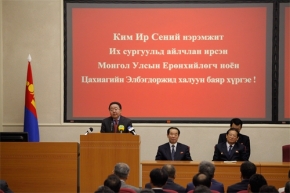ID :
305655
Tue, 11/05/2013 - 11:24
Auther :
Shortlink :
https://www.oananews.org/index.php//node/305655
The shortlink copeid
Ts.Elbegdorj: It is the human desire to live free that is an eternal power

Ulaanbaatar /MONTSAME/ The Mongolian President on October 31 delivered a lecture to scholars, professors and students of the Kim Il Sung University, N.Korea. Below is the part one of the English translation of the lecture.
Ts.Elbegdorj: It Is the Human Desire to Live Free That Is an Eternal Power.
Pyongyang Kim Il Sung University
I convey my sincere greetings to the scholars, professors and students of the Kim Il Sung University.
I am delighted to have this historic opportunity to visit the Kim Il Sung University and speak about Mongolia’s foreign policy and the relations between Mongolia and the Democratic People’s Republic of Korea.
Briefly, from history…
Mongolia is a peace-loving, independent, open country conducting multi-pillar foreign policy. The policies of the Mongolian Statehood have centuries-long traditions. As many of you know, in the 13-14th centuries Mongols had built the greatest empire on earth. In those times, Mongol Empire crafted its policies and governed by a written law, and the law was called “Ikh Zasag”. Back then, Mongols promoted free trade and ran open foreign policy.
Scholars note that it was precisely in the years of the Mongol Empire that the oriental and occidental worlds, Asia and Europe were genuinely connected. The Great Mongol Empire respected the people’s freedom of faith and freedom to create. The Empire ran very active policies toward Asia, Europe and Middle East. These were the Mongol envoys, messengers and diplomats that embodied and molded diplomatic immunity in the true sense of the word. You may have also heard that for foreign missions Mongol envoys and diplomats were given golden, silver, copper, brass and wooden Gerege -plates that carried the Khaan’s decree affirming the immunity of the bearer of the Gerege and calling for his free passage and travel.
These were the times when Mongols strived to establish trusted relations and engage in talks with other countries with trust and confidence. I wish to note that the Great Mongol Empire never waged wars without a justifiable reason.
Being built and flourished cross centuries, the Great Mongol Empire had seen a collapse, disunity and decadence through centuries.
Modern Mongolia restored her freedom and independence in December 1911. Since proclaiming her freedom and independence Mongolia engaged in very active foreign policy. In 1961, Mongolia joined the United Nations Organization.
(to be continued)





